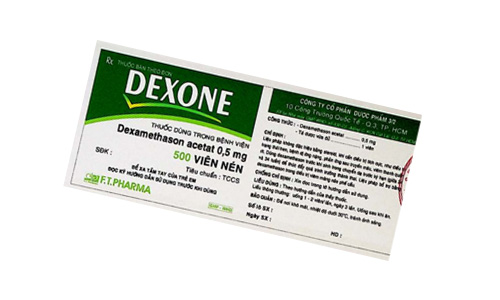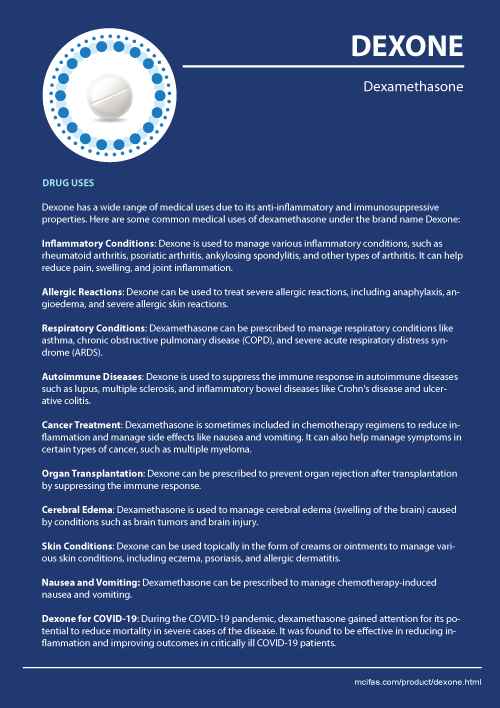Dexone Prescribing Information
Dexone is a brand name that has been associated with a medication called dexamethasone. Dexamethasone is a type of corticosteroid medication. Corticosteroids are hormones that are produced naturally by the adrenal glands, and they play a crucial role in regulating various bodily functions, including inflammation and immune response.

Uses of Dexone
Dexone has a wide range of medical uses due to its anti-inflammatory and immunosuppressive properties. Here are some common medical uses of dexamethasone:
- Inflammatory Conditions: Medicine is used to manage various inflammatory conditions, such as rheumatoid arthritis, psoriatic arthritis, ankylosing spondylitis, and other types of arthritis. It can help reduce pain, swelling, and joint inflammation.
- Allergic Reactions: Antibiotic can be used to treat severe allergic reactions, including anaphylaxis, angioedema, and severe allergic skin reactions.
- Respiratory Conditions: Dexamethasone can be prescribed to manage respiratory conditions like asthma, chronic obstructive pulmonary disease (COPD), and severe acute respiratory distress syndrome (ARDS).
- Autoimmune Diseases: Dexone is used to suppress the immune response in autoimmune diseases such as lupus, multiple sclerosis, and inflammatory bowel diseases like Crohn's disease and ulcerative colitis.
- Cancer Treatment: Drug is sometimes included in chemotherapy regimens to reduce inflammation and manage side effects like nausea and vomiting. It can also help manage symptoms in certain types of cancer, such as multiple myeloma.
- Organ Transplantation: Medicament can be prescribed to prevent organ rejection after transplantation by suppressing the immune response.
- Cerebral Edema: Dexamethasone is used to manage cerebral edema (swelling of the brain) caused by conditions such as brain tumors and brain injury.
- Skin Conditions: Dexone can be used topically in the form of creams or ointments to manage various skin conditions, including eczema, psoriasis, and allergic dermatitis.
- Eye Conditions: Dexamethasone eye drops or ointments are used to treat inflammatory eye conditions, such as uveitis, allergic conjunctivitis, and eye inflammation after surgery.
- Nausea and Vomiting: Remedy can be prescribed to manage chemotherapy-induced nausea and vomiting.
Dexone for COVID-19: During the COVID-19 pandemic, dexamethasone gained attention for its potential to reduce mortality in severe cases of the disease. It was found to be effective in reducing inflammation and improving outcomes in critically ill COVID-19 patients.
Dosage
The dosage of Dexone can vary widely depending on the specific condition being treated, the severity of the condition, the patient's age, weight, and overall health, as well as the form of the medication (e.g., oral tablets, injections, eye drops, creams). Below are some general dosage guidelines for different forms and uses:
Oral Tablets (Systemic Use):
- Inflammatory Conditions: The usual adult starting dose is 0.75 to 9 mg per day, divided into 2 to 4 doses.
- Allergic Reactions: The dose can vary depending on the severity of the reaction but is often around 4 to 20 mg per day.
- Autoimmune Diseases: Doses can range from 1 to 6 mg per day or more, depending on the condition.
Injections (Intramuscular or Intravenous):
- Inflammatory Conditions: Initial doses can vary from 0.5 to 9 mg, with repeat injections as needed.
- Allergic Reactions: Doses can range from 4 to 20 mg, depending on the severity of the reaction.
Eye Drops or Ointments:
- Eye Inflammation: Usually, 1 or 2 drops are instilled into the eye(s) every 1 to 2 hours during the day.
Topical Creams or Ointments:
- Skin Conditions: Apply a thin layer to the affected area once or twice daily, as directed by your doctor.
Dosages can be adjusted over time based on the patient's response to treatment and any potential side effects. It's important to note that corticosteroids like dexamethasone should not be stopped suddenly, as this can lead to withdrawal symptoms. If you need to discontinue the medication, it should be done under the guidance of a healthcare professional who can gradually taper the dose.
Side Effects of Dexone
Dexone is a potent corticosteroid medication that can provide therapeutic benefits for various medical conditions. However, like all medications, it also comes with potential side effects. The likelihood and severity of these side effects can vary depending on factors such as the dosage, duration of treatment, individual patient characteristics, and the specific condition being treated. Here are some possible side effects associated with this drug:
Common Side Effects:
These side effects are relatively common and may occur with short-term or long-term use:
- Increased Appetite and Weight Gain: Dexamethasone can lead to increased hunger and weight gain, particularly when used for extended periods.
- Fluid Retention and Swelling: Corticosteroids like dexamethasone can cause fluid retention, leading to swelling in the face, hands, ankles, and feet.
- Mood Changes: Some individuals may experience mood swings, irritability, anxiety, or even depression while taking dexamethasone.
- Insomnia: Difficulty sleeping, insomnia, or changes in sleep patterns can occur.
- Increased Blood Pressure: Dexamethasone can raise blood pressure, which can be problematic for individuals with hypertension.
- High Blood Sugar Levels: Corticosteroids can cause elevated blood sugar levels, which may be of concern for individuals with diabetes or those at risk of developing diabetes.
Less Common but Potentially Serious Side Effects:
These side effects are less common but may require medical attention:
- Osteoporosis: Long-term use of dexamethasone can lead to bone thinning and an increased risk of fractures.
- Suppression of the Immune System: Dexamethasone can weaken the immune system, making individuals more susceptible to infections.
- Cushing's Syndrome: Prolonged high doses of dexamethasone can lead to a condition known as Cushing's syndrome, characterized by features like facial rounding, weight gain, and thinning of the skin.
- Gastrointestinal Issues: Dexamethasone can cause stomach ulcers or gastrointestinal bleeding, especially when used in high doses.
- Eye Issues: Long-term use of corticosteroids in the form of eye drops can lead to cataracts or increased intraocular pressure.
- Adrenal Suppression: If dexamethasone is stopped abruptly after long-term use, it can lead to adrenal insufficiency, where the body's natural cortisol production is suppressed.
Interaction with other drugs
Dexone can interact with other drugs, potentially affecting their effectiveness, increasing the risk of side effects, or altering the way they are metabolized in the body. Below are some notable drug interactions that can occur with this tablets:
Interactions that Increase the Risk of Side Effects:
- Nonsteroidal Anti-Inflammatory Drugs (NSAIDs): Concurrent use with NSAIDs like ibuprofen or aspirin can increase the risk of gastrointestinal ulcers and bleeding.
- Anticoagulants (Blood Thinners): Dexone can interact with blood-thinning medications, potentially increasing the risk of bleeding.
- Diuretics: Combining Dexone with diuretics (water pills) can lead to an increased risk of low potassium levels and fluid retention.
- Antidiabetic Medications: Medicine can elevate blood sugar levels, potentially affecting the effectiveness of antidiabetic medications.
- Vaccines: Corticosteroids can weaken the immune response to vaccines, potentially reducing their effectiveness.
Interactions that Alter Metabolism:
- Enzyme Inducers: Drugs that induce liver enzymes, like certain anticonvulsants and rifampin, can accelerate the metabolism of Dexone, reducing its effectiveness.
- Enzyme Inhibitors: Some medications, such as certain antifungal drugs and protease inhibitors, can slow down the metabolism of Dexamethasone, leading to an increased risk of side effects.
Interactions with Other Corticosteroids:
- Concurrent use of multiple corticosteroid medications, including inhaled, oral, and topical forms, can increase the risk of side effects associated with corticosteroid use.
Interactions with Other Medical Conditions:
- Certain medical conditions, such as diabetes, hypertension, and osteoporosis, can be affected by the use of Dexone, potentially requiring adjustments in treatment plans.
Immunosuppressant Medications:
- Dexone's immunosuppressive effects can interact with other immunosuppressant medications, which are often used in cases like organ transplantation.
It's important to note that this list is not exhaustive, and interactions can vary depending on the specific medications and individual patient characteristics.
What to avoid while on Dexone
While taking Dexone, there are certain precautions and activities you should be aware of to ensure your safety and to minimize the risk of potential interactions or side effects. Here are some things to avoid or be cautious about while on Dexone:
- Alcohol: Alcohol can increase the risk of stomach ulcers and gastrointestinal bleeding, which may be exacerbated by the use of Dexone. It's advisable to limit alcohol consumption or avoid it altogether while taking this medication.
- NSAIDs and Aspirin: Nonsteroidal anti-inflammatory drugs (NSAIDs) and aspirin can increase the risk of gastrointestinal ulcers and bleeding when taken with Dexone.
- Live Vaccines: Medicine can suppress the immune system, which might reduce the effectiveness of live vaccines. Avoid receiving live vaccines while on Dexone unless advised by your doctor.
- Contact with Sick Individuals: Since Dexone can weaken the immune system, it's a good idea to avoid close contact with individuals who have contagious illnesses, especially if you're taking the medication at higher doses or for an extended period.
- Abrupt Discontinuation: Do not stop taking Medicament suddenly, especially if you've been on it for an extended period. Abruptly discontinuing corticosteroids can lead to adrenal insufficiency, which can be dangerous.
- High-Risk Activities: Dexone can sometimes affect mood and coordination. Be cautious when engaging in activities that require mental alertness or physical coordination, such as driving or operating heavy machinery.
- Smoking: Smoking can decrease the effectiveness of corticosteroids like Dexone.
- Stressful Situations: During times of stress, your body may need higher doses of corticosteroids. If you experience significant physical stress (such as surgery, illness, or injury), consult your doctor for potential dose adjustments.
- Grapefruit: Grapefruit and its juice can interact with certain medications, including Dexone. To avoid potential interactions, it's recommended to avoid consuming grapefruit products.
Contraindications of Dexone
Contraindications are specific situations or conditions where the use of a medication is not recommended due to potential risks or adverse effects. Here are some contraindications for the use:
- Hypersensitivity to Dexone: If you have a known hypersensitivity or allergic reaction to dexamethasone or any of its components, drug should not be used.
- Systemic Fungal Infections: Dexone can suppress the immune system, making it harder for the body to fight infections. It should be avoided in patients with active systemic fungal infections unless the potential benefits outweigh the risks.
- Live Vaccines: Drug can weaken the immune response. Administration of live vaccines is generally contraindicated while on high-dose or prolonged treatment with Dexone due to the risk of inadequate vaccine response.
- Untreated Bacterial, Viral, or Parasitic Infections: Corticosteroids can mask or worsen the symptoms of certain infections. Use with caution or avoid in the presence of untreated infections.
- Peptic Ulcers and Gastrointestinal Bleeding: Dexone can increase the risk of gastrointestinal ulcers and bleeding. It should be used with caution or avoided in individuals with a history of peptic ulcers, recent gastrointestinal bleeding, or other gastrointestinal disorders.
- Immunization During High-Dose Therapy: The use of Dexone at high doses can reduce the effectiveness of vaccines. Immunization with live vaccines is not recommended during high-dose therapy or within a few months after treatment.
- Ocular Herpes Simplex: Dexone eye preparations should not be used in individuals with a history of ocular herpes simplex due to the risk of worsening the infection.
- Diverticulitis: Medicament should be used with caution in individuals with diverticulitis or diverticulosis due to the risk of perforation.
- Myasthenia Gravis: Dexamethasone can worsen muscle weakness in individuals with myasthenia gravis and should be used with caution.
- Tuberculosis: Corticosteroids can exacerbate tuberculosis. Dexone should be used cautiously or avoided in individuals with active or latent tuberculosis.
- Systemic Osteoporosis: Prolonged use of Dexone can lead to bone thinning (osteoporosis). It should be used cautiously or avoided in individuals with existing osteoporosis.
- Certain Endocrine Disorders: Antibiotic can affect hormone balance and should be used with caution in individuals with certain endocrine disorders like Cushing's syndrome, adrenal insufficiency, or diabetes.
Pregnancy and Dexone
Dexone and other corticosteroids are typically used in pregnancy only when the potential benefits outweigh the potential risks. Here are some considerations:
- Risk vs. Benefit: Corticosteroids like Dexone can have both potential benefits and risks during pregnancy. They might be prescribed to manage certain medical conditions that could pose a greater risk to the mother or the baby if left untreated.
- Fetal Development: There is some concern about the use of corticosteroids during pregnancy because they can potentially affect fetal development. However, the exact risk depends on the dosage, duration of use, and the specific medical condition being treated.
- Preterm Labor: In some cases, corticosteroids may be given to pregnant individuals at risk of preterm labor. This is because these medications can help accelerate lung development in the fetus, reducing the risk of respiratory issues if the baby is born prematurely.
- Alternative Options: Depending on the medical condition being treated, there might be alternative medications or treatments that are safer during pregnancy.
» Drug Uses (format pdf, 0.2 Mb)



